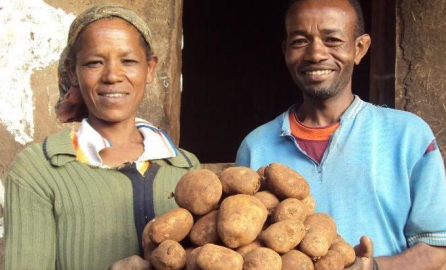The Irish Presidency of the European Union is well underway, with an ambitious development programme and a notable focus on hunger, nutrition and resilience. Gay Mitchell MEP, and Ireland’s Minister for Trade and Development, Joe Costello, gathered development stakeholders together last month to celebrate a remarkable agricultural coalition combating hunger in Sub-Saharan Africa – an Ethiopia-based food security project, centered on the potato.
The development agenda under the Irish Presidency of the EU is moving swiftly ahead following the first informal meeting of all 27 development ministers in Dublin in February. There, three priorities were identified: to deal with hunger and nutrition and the climate change related to it; secondly, to build up the area of resilience, and thirdly to prepare for the post 2015 Agenda after the Millennium Development Goals (MDGs).
“We are endeavouring to ensure that we get a combination of the Sustainable Development Goals (SDGs) and MDGs of the past, coming under the same framework,” said Ireland’s Minister for Trade and Development, Joe Costello, recently in Brussels. “The Irish Presidency is seeking to elaborate on all of these positions and reach council conclusions in May and June this year.”
Mr Costello addressed an audience at a special exhibition celebrating another important Irish-led coalition that is shaking the roots of hunger in Ethiopia. The event showcased Irish NGO Vita’s Potato Centre of Excellence, a project that marries the best of Irish and international agricultural research and education with knowledge sharing and business development.
Potatoes are an adaptive species that use less water per nutritional output than all other food sources, and they can potentially grow across Africa – making them a mighty tool in the fight against hunger.
The Potato Centre of Excellence successfully integrates science, business and development. The science end of the project is managed by the International Potato Centre (CIP), Arba Minch University, the Irish Agriculture and Food Development Authority (Teagasc), Wageningen University, and the Ethiopian Institute of Agricultural Research, who have initiated three research projects to naturally modify the potato for use in different environments. EuropeAid, Irish Aid and the Government of Ethiopia provide funding for the project. Work on the ground in 2013 includes the provision of quality approved seed potato to farmers and cooperatives, enhancement of farm productivity and storage and the commercialisation of seed cooperatives.
Gay Mitchell MEP, Joint Coordinator of the European Parliament’s Committee on Development for the EPP Group, hosted the event and stressed the importance of food security. “I think initiatives like this kind are coming because we are saying it’s not good enough to be reactive, you have to be proactive,“ he said.
“The population of the world will increase by two billion by 2050, 90% of whom will be born to what is now the developing world,“ he continued. “If we can make people more food secure in a variety of ways … in turn, they will have smaller families … so is not only in their interest, it’s in ours as well as we share this planet together.”
Mr Mitchell was joined by Chairman of the Vita Programme Committee, Larry O’Loughlin, who described the project as the “crème de la crème of the development projects that I’ve witnessed.” He cited the farmer peer-to-peer knowledge sharing aspect as a key feature, alongside the involvement of 'Co-op Managers', who provide storage facilities that allow the sale of excess crop at a later date. Furthermore, noted Mr O’ Loughlin, the project model is replicable, and has potential to reach as many as two million farmers in Ethiopia alone. Mr. O’Loughlin also advocated the need for closer working relationships between food security NGO’s.
“The immediate challenge for VITA at this time, as we want to expand to more regions to address the food shortages, is to get further funding,“ said Asfaw Mekuria, Vita’s Ethiopia Country Director. “The other is infrastructure, because we work in very remote rural areas,” he added.
Closing the evening, Gay Mitchell rallied the audience to focus on successful development outcomes, such as this project. “Let’s stop talking about the negative, it’s wearing people out!” he said. “If you tell people that there are 13,000 children per day not dying because of development aid and cooperation, they rise up and want to do more, so let’s start talking more about the successes.”
For more information, visit the Food and Nutrition Topic on capacity4dev.eu
This collaborative piece was drafted with input from Raymond Lataste, Jennifer Keegan-Buckley and Philippe Thomas, of the Rural Development, Food Security and Nutrition unit of EuropeAid, with support from the capacity4dev.eu Coordination Team.


Log in with your EU Login account to post or comment on the platform.